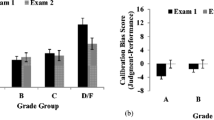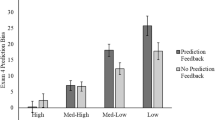Abstract
In two semester-long studies, we examined whether college students could improve their ability to accurately predict their own exam performance across multiple exams. We tested whether providing concrete feedback and incentives (i.e., extra credit) for accuracy would improve predictions by improving students’ metacognition, or awareness of their own knowledge. Students’ predictions were almost always higher than the grade they earned and this was particularly true for low-performing students. Experiment 1 demonstrated that providing incentives but minimal feedback failed to show improvement in students’ metacognition or performance. However, Experiment 2 showed that when feedback was made more concrete, metacognition improved for low performing students although exam scores did not improve across exams, suggesting that feedback and incentives influenced metacognitive monitoring but not control.


Similar content being viewed by others
References
Alicke, M. (1985). Global self-evaluation as determined by the desirability and controllability of trait adjectives. Journal of Personality and Social Psychology, 49, 1621–1630.
Deci, E. L., Koestner, R., & Ryan, R. M. (2001). Extrinsic rewards and intrinsic motivation: reconsidered once again. Review of Educational Research, 71, 1–27.
Dunning, D., Heath, C., & Suls, J. M. (2004). Flawed self-assessment: implications for health, education, and the workplace. Psychological Science in the Public Interest, 5, 69–106.
Dunlosky, J., & Metcalfe, J. (2009). Metacognition. Thousand Oaks, CA: SAGE Publications.
Dunlosky, J., Rawson, K. A., & McDonald, S. L. (2002). Influence of practice tests on the accuracy of predicting memory performance for paired associates, sentences, and text material. In T. J. Perfect & B. L. Schwartz (Eds.), Applied metacognition (pp. 68–92). Cambridge: Cambridge University Press.
Ehrlinger, J., Johnson, K., Banner, M., Dunning, D., & Kruger, J. (2008). Why the unskilled are unaware: further explorations of (absent) self-insight among the incompetent. Organizational Behavior and Human Decision Processes, 105, 98–121.
Everson, H. T., & Tobias, S. (1998). The ability to estimate knowledge and performance in college: a metacognitive analysis. Instructional Science, 26, 65–79.
Flavell, J. H. (1979). Metacognition and cognitive monitoring. American Psychologist, 34, 906–911.
Gramzow, R. H., Willard, G., & Mendes, W. B. (2008). Big tales and cool heads: academic exaggeration is related to cardiac vagal reactivity. Emotion, 8, 138–144.
Hacker, D. J., Bol, L., & Bahbahani, K. (2008). Explaining calibration accuracy in classroom contexts: the effects of incentives, reflection, and explanatory style. Metacognition and Learning, 3, 101–121.
Hacker, D. J., Bol, L., Horgan, D. D., & Rakow, E. A. (2000). Test prediction and performance in a classroom context. Journal of Educational Psychology, 92, 160–170.
Karpicke, J. D., & Roediger, H. L. (2008). The critical importance of retrieval on learning. Science, 319, 966–968.
Kelemen, W. L., Winningham, R. G., & Weaver, C. A., III. (2007). Repeated testing sessions and scholastic aptitude in college students’ metacognitive accuracy. European Journal of Cognitive Psychology, 19, 689–717.
Krueger, J., & Mueller, R. A. (2002). Unskilled, unaware, or both? The better-than-average heuristic and statistical regression predict errors in estimates of own performance. Journal of Personality and Social Psychology, 82, 180–188.
Kruger, J., & Dunning, D. (1999). Unskilled and unaware of it: how difficulties recognizing one’s own incompetence lead to inflated self-assessments. Journal of Personality and Social Psychology, 77, 1121–1134.
Nietfeld, J. L., Cao, L., & Osborne, J. W. (2005). Metacognitive monitoring accuracy and student performance in the postsecondary classroom. The Journal of Experimental Education, 74, 7–28.
Thiede, K. W., Anderson, M. C. M., & Therriault, D. (2003). Accuracy of metacognitive monitoring affects learning of texts. Journal of Educational Psychology, 95, 66–73.
Author information
Authors and Affiliations
Corresponding author
Rights and permissions
About this article
Cite this article
Miller, T.M., Geraci, L. Training metacognition in the classroom: the influence of incentives and feedback on exam predictions. Metacognition Learning 6, 303–314 (2011). https://doi.org/10.1007/s11409-011-9083-7
Received:
Accepted:
Published:
Issue Date:
DOI: https://doi.org/10.1007/s11409-011-9083-7




